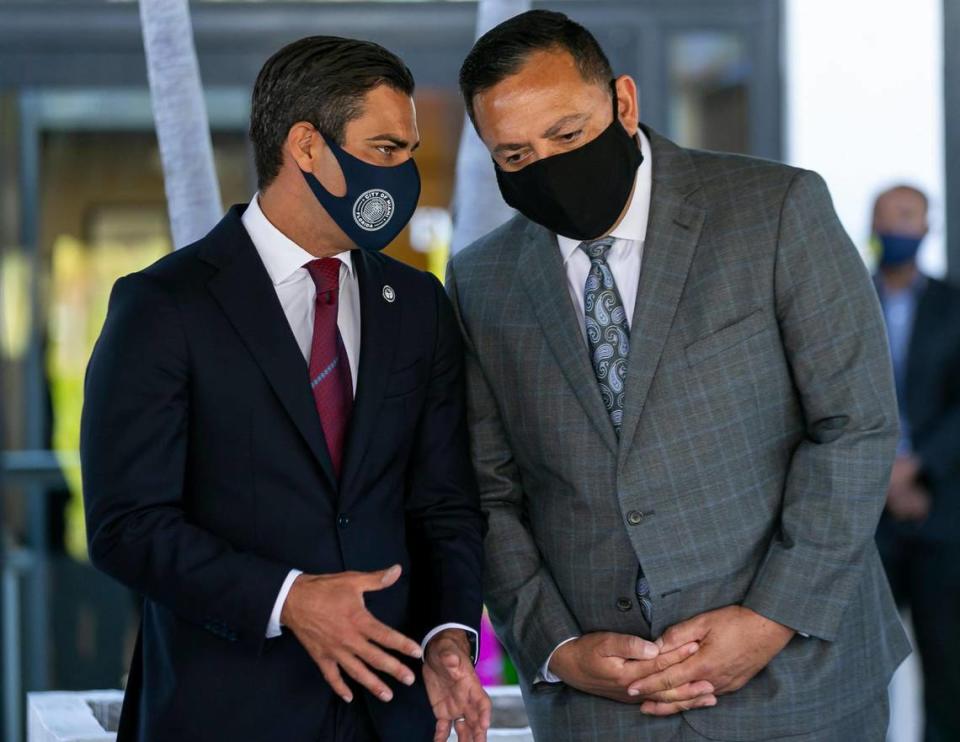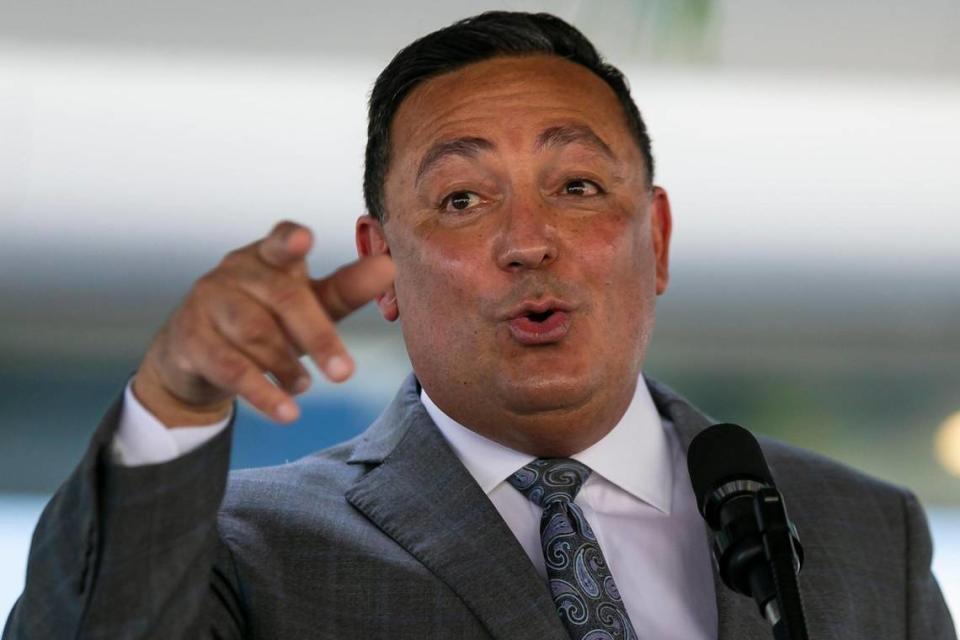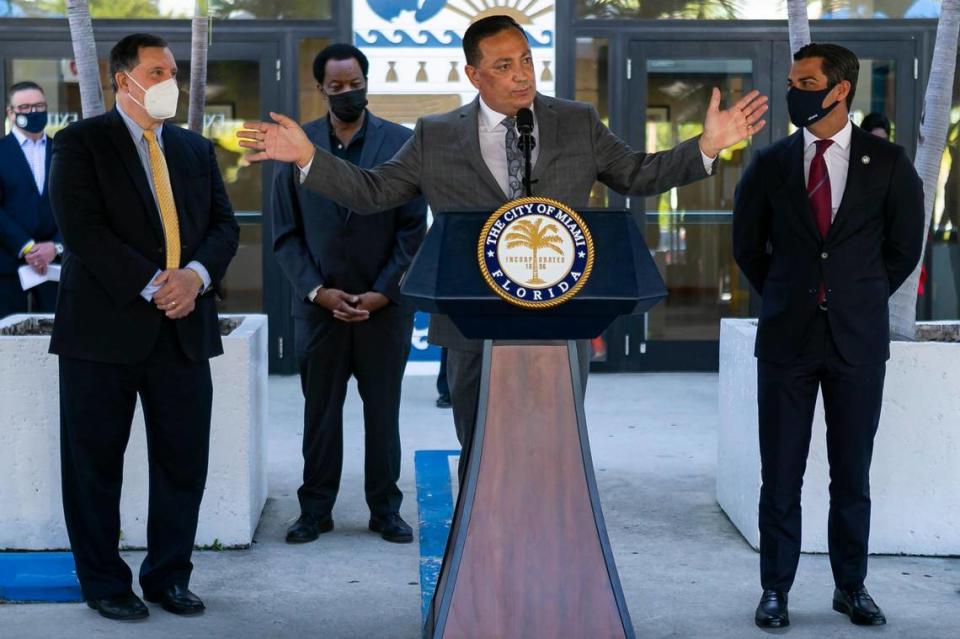Houston’s police chief brings bravado to Miami PD: ‘We will not tolerate mediocrity’
Standing before a row of microphones outside City Hall, Miami’s next police chief peeled off his protective mask and spoke of his success rate in Texas at firing rogue cops, and his belief that social justice values and law and order can coexist.
“We will not tolerate mediocrity at the Miami Police Department,” Art Acevedo — still chief in Houston for a few more weeks — said Monday morning. “And I will not apologize for getting rid of mediocrity because when you allow mediocrity to fester, the community sees it. They know it, and it spreads like a cancer.”
Not known to be interested in leaving Texas, much less angling for a job in Miami, Acevedo was announced Monday as the surprise pick to be Miami’s next top cop. He will take the reins of the city’s 1,400-person police force around the start of May, bringing bravado to a force just released from federal supervision.
Acevedo, 56, is leaving behind the fourth largest police department in the country in Houston, where he rose to national prominence by marching and kneeling with police protesters and firing barbs at prominent politicians. The agency, with more than 6,000 sworn and civilian personnel, has a budget of more than $1 billion, equal to Miami’s entire municipal budget. Acevedo was there for five years.
“I think this is like getting the Tom Brady or Michael Jordan of police chiefs,” said Miami Mayor Francis Suarez, who secretly recruited Acevedo amid a national search for a new Miami chief.

‘Calls it like he sees it’
Cuban-American, married and with a teenage son, Acevedo cuts a colorful and controversial figure. And he’s not without detractors after both seeking the spotlight and enduring a series of high-profile incidents under his watch during stints in California and Texas.
He’s a Republican who chose to speak on video during the opening night of last year’s Democratic National Convention. That was more than two months after responding sharply to a demand by then-President Donald Trump that governors begin dominating protesters or he’d send in the military. Acevedo told the president to keep his “mouth shut” if he didn’t have anything constructive to say.
Prolific on Twitter and with a large following, Acevedo is known to be an outspoken anti-gun-violence crusader who became a fixture on CNN, mostly for his political views the past year during the social justice and police reform uprisings. He also got into a spat with Texas Gov. Greg Abbott last year, calling him “hypocritical” for flip-flopping when he said those who don’t wear masks can’t be penalized.
Shame on you @tedcruz, @GOPLeader, and all who fed the false narrative about our election, which has led to what we are witnessing in our Nation’s Capitol. You fanned the flames of mistrust and history will hold you accountable for the ensuing chaos. Outrageous!
— Chief Art Acevedo (@ArtAcevedo) January 6, 2021
He made national headlines in 2016 as police chief in Austin when he criticized his own leadership team after one of his officers killed a naked, unarmed teenager. A leaked recording of Acevedo addressing his staff captured the chief’s frustration.
“If you can’t handle a kid in broad daylight, naked, and your first instinct is to come out with your gun, and your next instinct is to shoot the kid dead, you don’t need to be a cop,” he vented. “I don’t give a s--- how nice you are.”
Despite Acevedo’s progressive bent, Texas Monthly Magazine — a respected left-leaning publication — wrote a critical portrayal of the chief last June, saying critics accused him of “grandstanding” and “self-promotion.”
The article pointed out that though Acevedo is a proponent of doing away with cash bail for suspects, changed his Twitter profile to highlight George Floyd and wrote an op-ed in the Washington Post calling for police accountability, it didn’t quite jibe with what was going on in Houston.
The magazine also noted that though Acevedo condemned Floyd’s killing, his officers had shot and killed six men in the six prior weeks, five of them people of color. And, the magazine said, Acevedo refused to release any videos related to those shootings.
Acevedo was also criticized for his handling of a deadly no-knock warrant case in 2019 in which he at first stood by the statements of his officers. During the incident, two suspects, a woman and her husband, were killed and four officers were shot and injured. In January of this year, 12 of his officers were indicted after the Harris County District Attorney’s Office determined an officer lied in obtaining the warrant.

Acevedo tweeted that he was “disheartened” that the process to indict the officers took so long and he later eliminated some types of no-knock warrants in the department.
On Monday, the brother of the woman who was killed issued a statement saying Acevedo has yet to acknowledge Rhogena Nicholas was killed in the botched raid.
“To this day he still has not contacted our family or apologized,” said John Nicholas. “His legacy in Houston must include the coverup of this terrible incident. In the end, Mr. Acevedo did our family no justice.”
Chuck Wexler, executive director of the Police Executive Research Forum said the initial information received by Acevedo turned out to be wrong and he dealt with it accordingly. Wexler, who recently appeared in a Washington Post forum on violent crime with Acevedo, called the hiring of Acevedo a home run.
“With Art, it’s like you’re getting a first-round draft choice — with experience. He’s outspoken and calls it like he sees it,” Wexler said.
Only a few knew
Other than just a few people at City Hall, the recruitment and hiring of Acevedo wasn’t on anyone’s radar. He didn’t participate in the months-long interview process by City Manager Art Noriega, who has sole responsibility for the hiring of the city’s police chief. Noriega confirmed Acevedo’s hiring to the Miami Herald Sunday night.
The announcement came after a lengthy search for a successor to Chief Jorge Colina, who retired in February after three years. Miami was expected to name a new chief more than six weeks ago. As the delay dragged on, speculation of a tug-of-war between city leaders over veteran Miami police senior staffers ran rampant in the public, at police headquarters and in City Hall.
That didn’t turn out to be the case. Though Acevedo never formally applied for the post, he connected with Suarez through the mayor’s membership in the U.S. Conference of Mayors. Noriega, who met with Acevedo over the past month, began to recruit him.
“It helps to have a mayor that has the profile that he does,” Noriega said. “We just landed a change agent for the city in terms of just policing and law enforcement.”
Noriega, who met quietly with Acevedo on two occasions two weeks ago, said the deal was finalized in recent days. Late Sunday, Acevedo emailed his officers to inform them of his departure, according to the Houston Chronicle.

His background: Cuban-born
Acevedo was born in Havana and is the son of a Cuban police officer. The Acevedo family emigrated to the U.S. in 1968, settling in California. He received a Bachelor of Science degree from the University of La Verne.
He easily slipped in and out of a distinctly Cuban Spanish during the news conference Monday, as if to underscore his bona fides with the exile community.
“My mom and dad would tell me, ‘Remember, the worst day in the U.S. with the freedom that we have is better than the best day under communist rule in Cuba,’” he said, adding that he and his family are proudly gusanos, or worms, a term Fidel Castro used to ridicule exiles who fled the island. Some Cuban Americans wear the term as a badge of honor.
Alex Piquero, who chairs the sociology department at the University of Miami, said he was surprised Miami hired an outsider. He said Acevedo’s visibility and outspokenness may rub some people the wrong way, “but he supports the cops and the community.”
“He’s a real high-profile, highly visible chief,” Piquero said. “And he’s dealt with a lot of high-profile events.”
Early in his career Acevedo served in East Los Angeles for the California Highway Patrol, eventually working his way to chief in 2005. By 2007, he became police chief in Austin, Texas. In 2016, he became the first Hispanic to run Houston’s police department. Acevedo currently serves as president of the Major Cities Chiefs Association, a professional organization of police executives.
New face in Miami
The hiring of an outsider is a rarity for Miami’s force, which was expected to once again elevate a senior officer to the position of chief.
The two leading candidates were believed to be Manuel Morales, a 26-year veteran who has spent the past 11 years as a member of the department’s executive command team and who currently oversees field operations, and Maj. Francisco “Frank” Fernandez, a 29-year veteran and major who now commands the Central Patrol District, which runs from downtown to Wynwood and out to Allapattah.
Miami hasn’t gone outside the department to hire a police chief since the Manny Diaz administration hired former Philadelphia Police Commissioner John Timoney in 2002. At the time, Timoney was the first external candidate in more than three decades to become Miami police chief.
The city announced in September that Colina, who led the department through federal oversight after a series of police shootings, the pandemic and last summer’s protests, was planning to retire at the end of January. Among the candidates who applied was senior staffer and Assistant Chief of Police Cherise Gause and several officers from other cities around the country.
Gause is a 25-year veteran who is in charge of administrative functions, which includes technology support, property and evidence and training. She’s a strong advocate for community policing who has overseen criminal investigations and commanded a district.
Noriega said the internal candidates were strong and that he would understand criticism if he’d hired an outsider with the same level of experience. But the manager said he believes Acevedo’s background will complement Miami’s command staff.
“He kind of considers himself a chief-maker. From a command staff standpoint, they should all react incredibly positively to the idea that we’re bringing in somebody who can take them to the next level,” Noriega said. “It’s not slight on them. There were some good internal candidates. But with his background and his skill set, it really is a no-brainer and they should be able to understand that.”
Listen to today's top stories from the Miami Herald:
Subscribe: Apple Podcasts | Spotify | Amazon Alexa | Google Assistant | More options
El Nuevo Herald staff writer Jimena Tavel contributed to this report.

